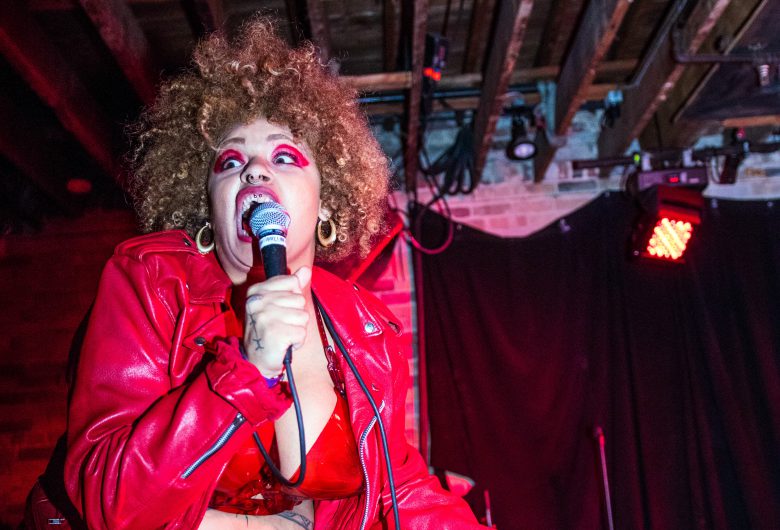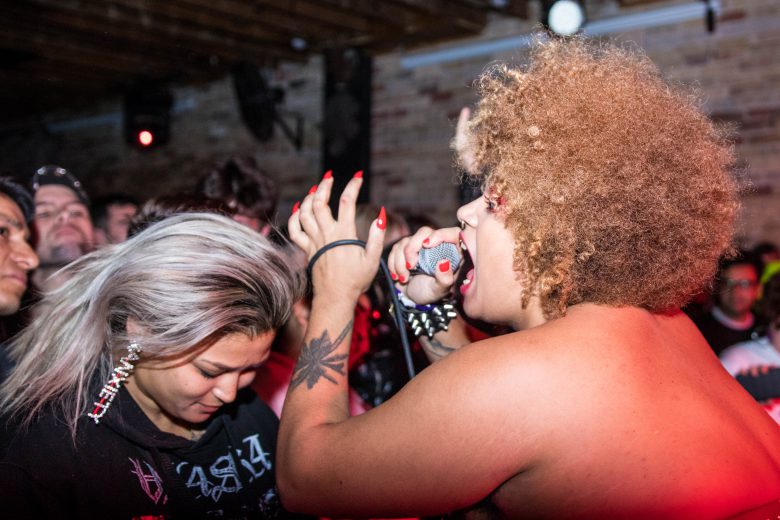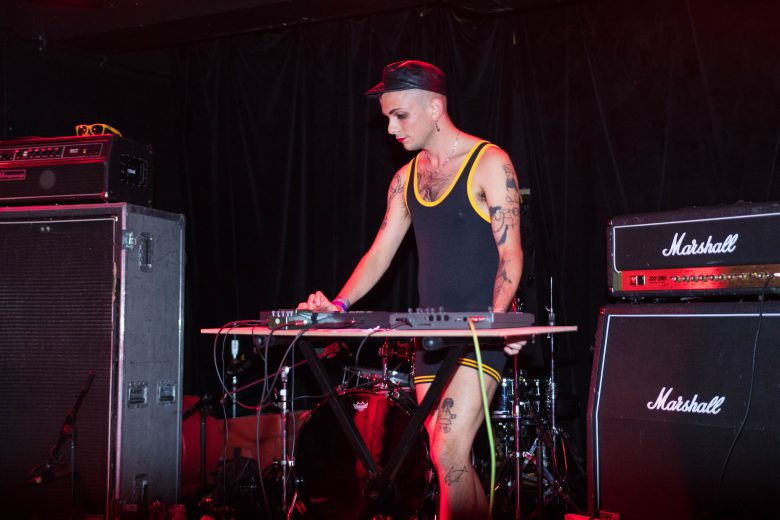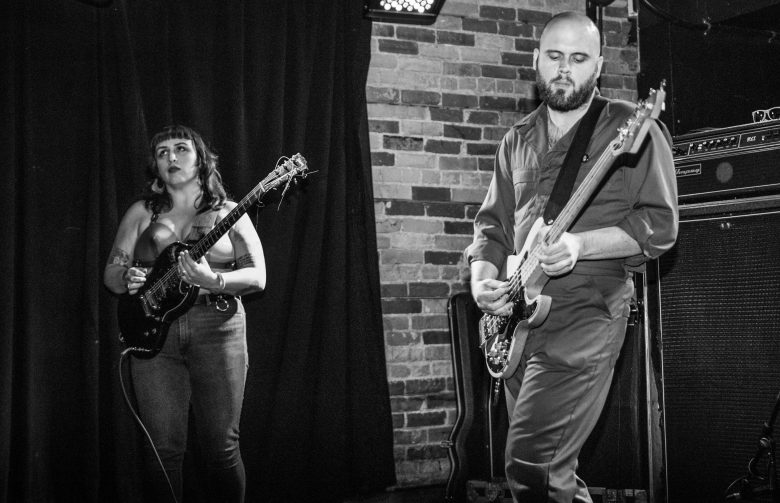The synth-punk band Special Interest tore a hole in this year’s Not Dead Yet festival in Toronto last month.
The band’s appearance at the annual punk festival was preceded by their reputation for aggressively breaking down the audience/performer dynamic. With song titles like “The State, The Industry, The Community, and Her Lover,” they have a clear motivation to create a conversation about the performer versus the systems of control they are forced to operate within.
While using old-school punk tropes such as physical and lyrical aggression, the band also rejects many of the politics put in place within the punk community itself, in order to create an entirely new — and very overdue — conversation within it.
The New Orleans-based band may be here to party, but they are not here for that passive shit. Their disposition is refreshingly reminiscent of a time when the term “punk” was motivated by a distinct urge to radicalize its surroundings, while also throwing a really good party.
We got to chat with band members Alli Logout, Maria Elena Delgado, Ruth Ex, and Nathan Cassiani about their relationship to the punk community, and how in 2018, identity politics around queerness and race may be causing more trouble than progress. Read the full Q&A after the jump!
�
Hey Special Interest! Although it seems you’ve done a significant amount of shows, and have a couple releases out, when I went to do some more research for this interview It seems like no one really knew much about you all. Why is that?
Nathan: No one knows what’s going on in New Orleans.
Alli: Nobody cares about the south, unless it’s Texas! I just feel like nobody looks past the east coast.
Okay. Give me the breakdown. I don’t know any of the traits of the American scenes these days.
Maria: Well, there’s the epicentre of where people believe culture is, and that’s New York and also the West Coast. So that’s where they think all of the culture is, and they’re terribly wrong.
Ruth: People pay attention to Austin.
Alia: They did. Austin has been dead. There’s a lot of great bands in Austin, but people just don’t look in New Orleans, especially for punk.
Nathan: Culturally, [New Orleans] as a city is not like any other city in the USA, so it’s on its own terms I guess. As far as punk goes, people from outside of there don’t know how to navigate it. Once we started playing shows, other bands would try to get in touch with us to help them book something, because they don’t know what the fuck to do with that part of the country. From Atlanta to like Texas, it’s just like a black hole for most people!
I looked at some of the bands that were happening in New Orleans and it seems like the punk scene is actually really arty! It kind of looks like something from when New York was cool, in that lower east side 1980s way. Are bands in New Orleans maybe artier or freakier because of that isolation?
Nathan: I think it’s maybe because it’s not really in tune with whatever “cool” scenes are happening nationally, so people are kind of doing their own thing. I mean, people know about shit from the past. Whatever. They have good influences.
Allia: That’s also the thing about the punks in New Orleans: They’re not obsessed with the Internet, or they don’t care about what trends are happening elsewhere.
Maria: There’s a sense of a lack of relevance, because if you’re already living in the south, like who gives a fuck about the other scenes because its a different, smaller pool of people.
Ruth: I feel like the entire time I’ve been there it’s been a very small, insular group of people making music, like 15 people max.
Do you rep the scene or are you bummed out by how small it is?
Special Interest: Yeah! It’s the best city.
Ruth: There’s a really great, weird energy and vibe to it. It’s a really bizarre place!
You just mentioned “trends in punk,” which seems like a super gross concept to me. What are some of the current “trends in punk”?
Ruth: I think like synthesizers in punk is now becoming a trend in the last few years, so I guess we are on that bandwagon! Also reverb-y vocals are a thing for sure. Everybody dresses the same…straight guys dressing like they’re gay! It’s really distressing.
Alli: It’s so sad! And straight girls dressing like they’re gay! I feel like we are always trapped in this weird bind. Like this entire festival we’ve been looking around at people trying to cruise and like, “Oh, you’re straight, but you look so gay…”
What are your thoughts on the diminishing existence of DIY spaces throughout North America? Is that something you’re witnessing? I wonder how that’s changing the nature of the punk scenes, in terms of contributing to the community as being central to the idea of a punk.
Maria: It reminds me of like Minneapolis 10 years ago, where what I think happened is that all of the DIY spaces got shut down for whatever reasons, so then contributing to the space that you’re running yourself with your friends is like the way that everyone contributes, because obviously not everyone has to be in a band. When all those places get shut down because of the RNC, or because of new laws and all that bullshit, I think a lot of those aspects of participation kind of fall to the water, and then we’re playing at bars and less and less at DIY spaces.
You were talking about using synthesizers being a current trend, but the LA scene in the late ’70s and early ’80s was a very birth-of-synth-punk type place! Do you all take reference points from pioneering queer punk bands like Nervous Gender and The Screamers?
Nathan: Yah we like that! I feel like Ruth’s style is unique. The other night at a show someone said it reminded them more of the scarier side of Chicago House!
I think those bands are also a great example of the early use of violence or intimidation as a part of the performance dynamic, which is a prominent part of what you guys do as well. Alli’s entrance reminded me of the tales of Alan Vega’s threats to stab audience members at early Suicide shows, as a gesture of a group commitment to a lack of safety. In the era of “safe space” taking the central part of the social conversation, can you tell me about what that concept of violence in music looks like in a contemporary sense?
Alli: I definitely don’t believe in safe spaces. I don’t think any space is actually safe for me and my body and with the colour of my skin. So I think constantly about violence and love to break the fourth wall whenever I play. I just like to remind people that we’re not safe, and that they’re not going to be safe, and you’re not going to be safe anywhere. I like to grab people and shake them! I shook a person at our last show and she was VERY shook by it! But I do think like constantly about violence and I’m also very influenced by violence. All the words that I’m saying live, and how I’m acting on stage are a result of me feeling like I’m in a constant state of fear and just constantly threatened.
Are you saying that you don’t believe in safe space because you don’t have confidence that anyone is actually looking out for you or your specific interest?
Alli: I feel like punk is never really going to have a safe space. Just the whole concept of safe spaces I find very dumb. I don’t think it’s real. I mean I feel like I only feel safe whenever I’m around other black and brown queer people and it’s usually in a small group and we’re usually just talking and smoking a little weed and having a little kiki! That’s literally the only time when I feel “safe”.
Have you ever gotten in trouble for your violent onstage behaviour?
Alli: (Entire band laughs) Girl. Yes! A lot! We played in this nasty ass white punk house in wherever-the-fuck Massachusetts. The house was covered in rat shit and there were holes in the walls from people punching the wall – you know, boys being boys! So when we played I was like already really nervous! It was in the middle of the woods and the vibe was off so I thought I was gonna get my ass lynched! It was weird. Anyways, there was this live electrical wire hanging from the ceiling from a light that wasn’t working and I grabbed it and ripped it out and they freaked out! They were so mad I did that. Apparently if I were a white punk boy in a hardcore band and I punched a wall or like broke something they’d be like, “Keep doing that shit, man!”.
Is part of your work meaning to address the cliché about women of colour not being allowed to be “angry”?
Alli: Oh yeah. I’m so over that narrative. That’s definitely a thing. I spent a majority of my life, because I have always been in the position where no matter what I did, even if I didn’t do anything, I was always the one in trouble. Since I was a child, if I was around white people, I was always the one influencing the white kids to do bad things when in fact they were the ones influencing me to do drugs and have sex and stuff like that — which I wasn’t —but now it’s a different story! I did spend the majority of my life trying to please everyone, until I finally got the shit kicked out of me enough to the point I realized there was absolutely nothing I can do in this world to make people see me as the “nice white person,” or to have any sympathy for me and my body in the event I’m ever put into any sort of danger.
What do you think would happen if you put on a show where you put up posters that said you’re paying to enter an unsafe space? Would that work?
Nathan: I don’t know. I remember I was at a film screening of John Waters’ Pink Flamingos where it read “the most offensive film ever” on the flyer, and people still got really offended! They were really upset by it.
Ruth: A friend of ours, Jill, who performs as Forced Into Femininity is one of our favourite performers, and their whole performance schtick is about breaking down the barrier between audience and performer. When she’s performing she just fucking touches people, and climbs on people, and sometimes it’s funny, but sometimes it’s really fucking scary! She starts her set by playing the Dawson’s Creek theme song with an auto-tuned voice saying that if you don’t want to be touched to just leave because this all comes from a bad place. It’s incredible.
At your show at Not Dead Yet, the band previous to you, Permission, were, at least visually a more traditional sort of guy-in-shorts hardcore band. I felt the contrast between that and what you do was really extreme and levered your show in many ways. As part of the punk scene, do you find yourself sharing bills with more traditional bands or do you find people trying to lump you in with other “synth” or “queer bands”?
Nathan: We do end up playing with a lot of more traditional punk and hardcore bands…
Alli: [sings] I’m a boy, I’m a boy, I’m a BOY band!
Nathan: That’s just a network. It’s interesting because when we went on tour recently, I was trying to book some of the shows and trying to play in clubs where we are the only band instead of on a bill. We wanted to play with a bunch of DJs, but all the promoters would say, “Oh, there’s this other queer band in town – you should play with them!” and it was like, no that’s not what we want.
Recently when that band G.L.O.S.S. disbanded and made a statement about how their work was intended to be for queer people, by queer people, it seemed hard for a lot of the straight punk community to understand that concept. The band was specifically looking at how anger and violence could be something positive and cathartic for queer and marginalized people, who are often denied that outlet. So there can be power in that queer-only punk show, but you’re saying you’d rather not just play to the converted?
Nathan: I want to play different things. I want to play with, like, the best bands, or the best DJs or the best noise bands or whatever! I want it to be mixed.
Alli: We do like the, “I’m a boy, I’m a boy band” bands! It’s not that we don’t.
Do you ever worry that the growing attention to your band might compromise the aggressive nature of what you do, and mean you will have to dilute it? How would you deal with that?
Alli: People have been really supportive. It does happen, though. One thing is, I don’t know of any band that sounds like us at all, and that’s why I adore Special Interest. We also happen to finally be living in an era where people are trying to uplift black, brown, and queer voices, which I think is incredible, but I think it’s just like also a tad is annoying because I know that certain white people who are booking us are tokenizing. They’re checking boxes, as in ok, they got their queer band, or they got the black girl singing and your brown girl playing guitar and two hot Italians!
Um, that does sound pretty good, though!
Maria: Honestly, though, they are going to commodify it. The danger element gets commodified, and that’s always how it’s been. I think about Wendy O. Williams where it becomes more about the pressure to retain that amount of danger at the shows, rather than the music itself, because people are really emphasizing it.
Ruth: I mean, I just don’t think we’re like that theatrical. When Alli performs I don’t think of it as just antics, or putting on a show or using shock tactics. It just seems like it’s coming from a real place and I think that’s the difference. You don’t have to keep living up to that level of theatricality because it doesn’t seem like the point. She’s just testing people’s limits.
Alli: I’m a glam rocker! This isn’t shock. It’s glam. People are just really stressed out about seeing a black girl half naked. Like, that’s where people are shocked. They’re like, “Oh my god, she is comfortable in her own body and she also, like, is sexual or something! This is crazy!”. I feel like people find that stuff shocking and I think that’s why it’s extra funny.
Do you guys all come from different musical backgrounds? Are you all into the same type of stuff?
Alli: I think the foundation is No Wave.
Maria: Or post-punk. When we started I wanted to be in a band that sounded like The Screamers, and I didn’t want a drummer again, because drummers are always a pain in the ass. I don’t think we actually sound anything like The Screamers, even though we all wanted that, but it’s okay that we’re not like that. I think in the end we all are very much obsessed with all sorts of music and there are definite threads of continuity between all of us.
Ruth: I mean we’re all involved in the punk scene, and have played DIY shows in a similar network of people, but we all have disparate influences and that really shows.
Your band can be lazily described as “Queer Punk,” two terms which are actually super empty wherein “queer” is often used by so-called allies as a get-out-of-gay free card, and “punk” is meant to be about change and modernity, rather than a mould. What are your thoughts on being pigeonholed in that way?
Alli: Well, one, we don’t have to identify as a queer band and that is something I feel like we explicitly state constantly. We feel like the word “queer” is too caught up within a politic that we don’t align with. Like with the safe spaces, when you hear the word “queer” you automatically think of that safe space mentality. Queer Punk just sounds really safe, and I’m not going to create a space where it’s safe. This is unsafe. So we don’t align ourselves with that.
What about the word “trash”? Is there any room for bad taste in punk at this point?
Nathan: We love trash.
Alli: We’re definitely trash!
What keeps you in New Orleans, considering the struggle of the day-to-day life there?
Alli: I feel really at home there, and I’m completely surrounded by black folks every day and it’s really beautiful. I have a really great black community there and I also have a really great punk community, and the overlap of the black, punk and queer communities in New Orleans is really fun. I have such an incredible family unit there, and I have never had a family unit ever. My chosen family unit that I do have is predominantly all black and brown, all queer, and all from the south.
Maria: The thing is, you’re asking why do people choose to live in a place that has a shitty infrastructure, if any? It’s because there is a level of freedom that you can’t buy in other places because of space. Space itself.
Alli: Wherever we move, we’re not going to make money. Who do you know that makes money that didn’t come from money? Like that’s just the actual tea. So I’m going to live where I live because of the emotional ties, because of my connection to the south, and because of my ancestors connection to the south. I just think it’s my home and I love it so much. And I just love the attitude!
— Q&A by Kevin Hegge (@theekevinhegge) / Photography by Alex Kress
Special Interest’s LP Spiraling and demo album are both available on Bandcamp.





Be the first to comment on "OMG, a Q&A with Special Interest"